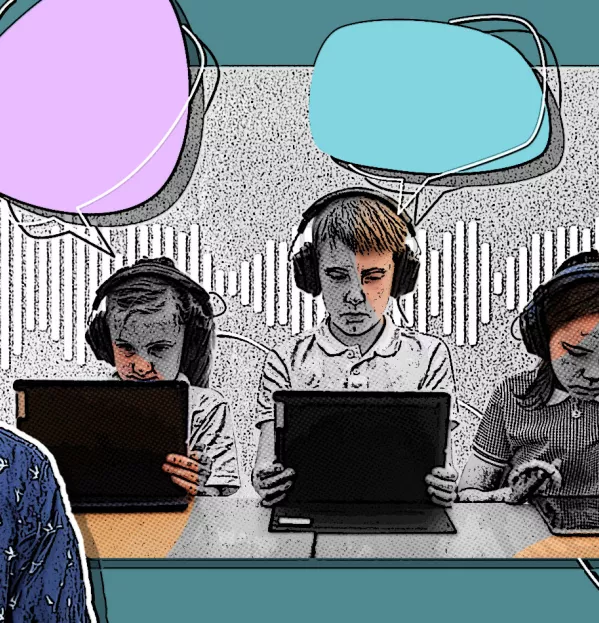
Neil Mercer: ŌĆśOracy is still not properly understoodŌĆÖ

The term ŌĆ£oracyŌĆØ - effective speaking, listening and oral communication - has been a buzzword in education in recent years, with many arguing that it should have a more prominent role in schools.
In 2023 Sir Keir Starmer, when he was leader of the opposition, pledged that the Labour Party would .
The following year, a report from the Commission on the Future of Oracy Education, chaired by Geoff Barton, former long-serving general secretary of the Association of School and College Leaders, called for more attention to be paid to oracy and for better teacher training on it.
Yet when the interim report from the governmentŌĆÖs review of curriculum and assessment was published in March, oracy was not mentioned at all. So, is Labour really serious about effecting change?
Neil Mercer, emeritus professor of education at the University of Cambridge and director of , has been studying the topic for decades. In his new book, Oracy: the transformative power of finding your voice, he details the research that shows why oracy should be placed on an equal footing with numeracy and literacy, and what effective oracy teaching looks like.
He speaks to Tes about why oracy matters, yet - despite all the evidence - there has been no policy change on it.
Tes: Oracy has been talked about for years. Why did you want to write this book now?
Neil Mercer: I think oracy is still not properly understood. I donŌĆÖt think policymakers always recognise what is involved and why it matters.
And journalists say to me, ŌĆ£Oh, so you want more debating and public speaking in state schools. Is that it?ŌĆØ And that is part of it. But itŌĆÖs not just that.
WeŌĆÖve tended to take for granted that spoken language skills just happen and youŌĆÖre good at it or not. Michael Gove, the former education secretary, said children just naturally learn to talk.
But thatŌĆÖs not true. We now know that unless itŌĆÖs treated holistically and recognised in its entirety, oracy will get pigeonholed as something thatŌĆÖs just what people in private schools do. ThatŌĆÖs why I wanted to write the book.
So what is involved with oracy?
There are three aspects:
1. Learning how to talk - thatŌĆÖs obvious. And thatŌĆÖs in all situations, not just in public.
2. Learning through talk - how well talk is used as a teaching and learning tool. So thatŌĆÖs about teachersŌĆÖ skills: how well they get students actively involved.
3. Learning about talk - if weŌĆÖre learning about poems and the periodic table, we should be learning about accents, dialects, vocabulary changes. What is English compared with other languages? Why does it have words that sound a bit French and a bit Latin? All this stuff is not the sort of thing youŌĆÖd find it hard to interest students with, compared with differentiation and integration.
And why does oracy matter?
We have clear evidence for how the development of childrenŌĆÖs cognitive skills is tied up with their language development, and also their school achievement.
Spoken language is partly how we become better at thinking. ItŌĆÖs by learning to think together that we learn better how to think alone as well.
Do we have good evidence for this?
The piece IŌĆÖm most confident about is the one that I with Christine Howe and Sara Hennessy.

We took 72 Year 6 teachers in 48 state primary schools. We looked at the way they used talk in the classroom and then related that to Sats results - not because we think Sats are great, because theyŌĆÖre not, but they are objective.
We found that if kids were more involved in classroom discussions, they got better results, as well as being happier.
Had that been proven before?
That had been suggested by some small-scale studies. But we had a lot more data.
And what was unique about our study was that we found the students only got better results if all of the three elements happened: if there were high levels of participation in all-classroom discussions, if teachers got students to elaborate on their ideas and if teachers got students to question each otherŌĆÖs ideas.
ŌĆśMichael Gove said children just naturally learn to talk. But thatŌĆÖs not trueŌĆÖ
After us, Robin Alexander and his colleagues at the University of York did a similar study and they got similar results. So there you have two big studies that say it.
Why do you think there is a link between effective oracy teaching and better exam results?
If you actively involve students in classroom talk, they have to think aloud about what they understand.
That means that as a teacher, you realise what they donŌĆÖt understand. So in the next lesson, you change your plan to make sure they do understand.
Given all this evidence, why hasnŌĆÖt there been any policy change from government?
I think there are a couple of reasons - both because of an ideological commitment, not because of a lack of evidence.
One is that oracy has been falsely linked to ŌĆ£progressiveŌĆØ education. ItŌĆÖs that idea Gove had of more talk in the classroom meaning more ŌĆ£idle chatŌĆØ - as though thatŌĆÖs what oracy means. And there was the perception that oracy was a distraction from teaching maths or whatever else.

But there is also a conspiracy theory explanation for why oracy has had such a hard time politically, which is that the people in power donŌĆÖt want our children to learn how to speak effectively in public or to take control of meetings or to feel confident expressing their views - because we might take over the country.
Eton has been teaching oracy forever. As I quote in the book, the director of teaching there said: ŌĆ£It is not OK for a boy at Eton not to speak in lessons.ŌĆØ
ThatŌĆÖs what weŌĆÖre saying should happen in every school.
How else do issues of class feed into conversations on oracy?
There is a history of thinking that public speaking and being able to take control of conversational events is something that only posh people do. ThatŌĆÖs a shame because there are so many working-class and ethnic cultures in Britain that have strong oral traditions.
But oracy is not about getting people to ŌĆ£lose their accentsŌĆØ, to always speak in standard English or to use a received pronunciation accent like [former Conservative minister] Jacob Rees-Mogg. ItŌĆÖs about realising that there are different situations in which you can use different styles of speaking.
ŌĆśThe people in power donŌĆÖt want our children to learn how to speak effectively in publicŌĆÖ
There are some sociolinguists who, quite rightly, are standing up against prejudice and misinformation about accents and dialects in non-standard English. But where I think theyŌĆÖre wrong is where they say itŌĆÖs wrong to encourage people to learn to speak in other ways.
I just donŌĆÖt think thatŌĆÖs true. I donŌĆÖt think you need to forget English to learn French, and I donŌĆÖt think you need to forget a Cumbrian dialect to also be able to speak in standard English.
We can develop a repertoire of ways of speaking.
Both Keir Starmer and education secretary Bridget Phillipson have referenced the importance of oracy. Do you believe that Labour will act, given that previous governments did not?
I canŌĆÖt give a definitive answer either way.
One thing that bothers me is that the interim curriculum [and assessment] review report didnŌĆÖt mention oracy at all, which I think is remarkable and very unfortunate.
But itŌĆÖs not the final review, and we have been indirectly reassured by Becky Francis, the chair of the review, that oracy will figure somehow.
On the other hand, the most recent appointment as adviser to Keir Starmer is Oli de Botton, the former headteacher at School 21, the founder of Voice 21 and the person who came along to ask me and my colleagues here to create the . So that is a hopeful sign.
But IŌĆÖm not relaxed about it. They will be under immense pressure from the contrarians, from the people who still think oracy is opposed to high standards and who think that [if we focus on oracy] we will somehow slip down the international league tables, which is just not true.
It seems ironic that we are considered the leading place for oracy in the world and yet thereŌĆÖs still ambivalence about whether itŌĆÖs important.
Besides the politics, what are the challenges in introducing oracy into the curriculum?
One potential barrier, which is a totally understandable one, is if teachers think, ŌĆ£Oh my God, hereŌĆÖs another thing IŌĆÖve got to do as well.ŌĆØ If itŌĆÖs presented in that way, some teachers might feel resistant.
ŌĆśOracy shows that everyoneŌĆÖs voices are respectedŌĆÖ
Compared with, say, 20 years ago, I find that teachers are not the obstacles to oracy being introduced in the way that policymakers have been. Teachers see the value of it.
But the way we need to present it to them is that if you do it, itŌĆÖs not like youŌĆÖve got to do oracy as well as science education. ItŌĆÖs: if you do oracy, science education gets better.
What else would you say to anyone who still isnŌĆÖt convinced?
ThereŌĆÖs evidence that behaviour improves when you introduce oracy because it brings the rules of social engagement out into the open and it brings in a level of respect; it shows that everyoneŌĆÖs voices are respected.
I just hope weŌĆÖre making it clear enough to the people that matter that the evidence is really there, and that weŌĆÖve passed that time of resistance.
by Neil Mercer is published by The Bodley Head
For the latest education news and analysis delivered every weekday morning, sign up for the Tes Daily newsletter
Want to keep reading for free?
Register with Tes and you can read five free articles every month, plus you'll have access to our range of award-winning newsletters.
Register with Tes and you can read five free articles every month, plus you'll have access to our range of award-winning newsletters.
Keep reading for just ┬Ż4.90 per month
You've reached your limit of free articles this month. Subscribe for ┬Ż4.90 per month for three months and get:
- Unlimited access to all Tes magazine content
- Exclusive subscriber-only stories
- Award-winning email newsletters
You've reached your limit of free articles this month. Subscribe for ┬Ż4.90 per month for three months and get:
- Unlimited access to all Tes magazine content
- Exclusive subscriber-only stories
- Award-winning email newsletters
topics in this article



